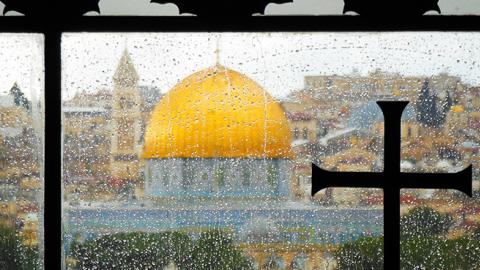It’s recently been reported that the State of Israel plans to seek financial reparations for losses suffered by more than 850,000 Jews between 1948 and 1970. During those years, Jews were either formally expelled from their ancestral Middle East motherlands, or fled with little more than the shirts on their backs to avoid eminent bloodshed.
The expulsion of Middle Eastern Jews marks one of modern history’s most notorious eruptions of brutal religious persecution and ethnic cleansing. It exclusively targeted Jewish people. And at last the long-delayed accounting has finally arrived, albeit some 50 years after the fact.
According to Jewish News Service:
bq(blockquote). After 18 months of secret research with the help of an international accountancy firm, the State of Israel is preparing to officially demand compensation for assets abandoned by Jews who were forced to flee eight Arab countries after the establishment of the State of Israel, to the tune of $250 billion.
The countries in question are Libya, Tunisia, Morocco, Iraq, Syria, Egypt, Yemen and Iran.
The fact that so much of the world remains unaware of the evictions and thievery perpetrated against hundreds of thousands of Jews never ceases to amaze me.
For more than 30 years, I’ve researched and written about religious persecution and antisemitism. And yet until fairly recently, I knew nothing about this enormous catastrophe in the Middle East.
In 2006, I traveled to visit Israel and lived there for more than 10 years. It was only as I began to write in my book, Saturday People, Sunday People: Israel through the eyes of a Christian Sojourner, that I first learned about Jewish refugees from Arab lands. And I discovered it almost by accident.
While I was attending a 2009 conference in Herzliya, I wandered into a panel discussion about something called “The Forgotten Refugees.” The participants were discussing a documentary by that name.
One panelist after another left me increasingly puzzled. The immigration of European Jewish refugees in Israel is, of course, a well-known story. But that was not the subject here. This was all about Jews who had once lived in Middle Eastern states and had been forced to leave.
Speakers described their families fleeing for their lives, leaving everything behind. Some talked matter-of-factly; others spoke with great emotion and many tears. They mentioned one country after another. They described being driven out of ancestral homelands where Jews had lived, in some cases, since the sixth century BCE.
Their assets were seized; their businesses and homes were confiscated. Those Jews from Arab countries, as well as Iran, found themselves homeless, penniless and without refuge. Some 600,000 went to Israel – at the time a poor country that struggled to care for them. Many lived in tents, in primitive conditions, for months if not years.
Preparing for my trip, I’d read half a dozen lengthy histories of Israel other accounts about the Jewish people. Why did they offer so few words about such a monstrous event? Why had those refugees fallen off the radar screen?
I was particularly shocked to find that there were actually more Jewish refugees from Muslim lands than there were much-publicized Arab Palestinians who fled Israel during military conflicts. Why had there been so few comparative accounts until now?
Other questions remain as well: First, why were those Jews expelled from those eight Muslim lands in the first place?
You can call it Arab antisemitism if you like, or blame it bruised honor after failed military incursions. But, in actual fact, the expulsions were brought about by vicious religious persecution and radical ethnic discrimination.
Of course, when it comes to Jews, that’s nothing new. Their persecution began not long after they were exiled from their homeland by the Romans in 70 CE.
More recently, in the 19th century, pogroms in Eastern Europe and Russia caused tens of thousands of Jewish deaths and led to massive immigration to the West and even to Israel. Tragically, most of those attacks were done in the name of Christianity.
Then came Nazism, not a direct expression of Christianity, but made possible by false doctrine and flawed biblical exposition – what we call “replacement theology” today – along with vile racial arrogance.
Thankfully, times have changed. Christians have learned heartbreaking lessons from the Holocaust, as well as from Armenian and Greek genocide at the hand of Muslim Turks during and after World War I.
Meanwhile, in today’s world, Christianity is under assault as never before. Just five years ago, two of the same countries that expelled their Jews—Iraq and Syria—allowed Islamist genocide to take place within their borders against Christians at the hand of ISIS and other radical jihadis.
Today, in 2019, across the world, more Christians are in mortal danger because of their faith than ever before in history. At the same time, attacks on Jews and Jewish property are increasing exponentially worldwide.
That raises another question: Why was there a 2014 genocide against Christians in the same Middle Eastern countries that targeted the Jews during the 20th Century expulsions?
While I was writing Saturday People, Sunday People, I came across a slogan well-known to Islamist jihadis: “First comes Saturday, then comes Sunday.” Or, more precisely, “On Saturday we kill the Jews, on Sunday we kill the Christians.”
Today, the Middle East is rife with dangers to two specific religio-ethnic groups: Israeli Jews (virtually the only Jews left in the region) who are now defended by the very capable Israel Defense Forces. And Christians, who are fleeing their ancestral lands, lacking any reliable and consistent support or protection. In fact, Israel is the only country in the Middle East where the Christian population is increasing.
Radicalized forms of Islam are nothing new, but they were inflamed in Middle East by the infamous Mufti of Jerusalem, Amin al-Husseini, who took his Jew-hatred to Germany and offered it to Adolf Hitler. Inspired by his meetings with the Fuhrer, he returned to Jerusalem, where he and his minions proceeded to intentionally poison the Middle East’s Muslims by blending Nazism with their already toxic brand of ethnic and religious Jew-hatred.
Hitler and al-Husseini were ultimately defeated, but their toxins still linger, even among Christian minorities in Islamic states.
Nonetheless, as never before, new alliances are being formed. The Jewish state is creating unprecedented bonds in Asia, Africa and Latin America. Sunni Arab states are quietly meeting with Israelis and discussing plans to stand against Iran’s deadly Shia incursions.
But most remarkable of all is the rising worldwide Christian support for the Jewish state, which is shared by untold millions of believers. Working together, Christians and Jews are shattering the construct of lies that has led to past religious abuses and ethnic persecution.
Will Israel successfully reclaim $250 billion for the 850,000 expelled Jews? One Israeli think tank stated the case bluntly: “No solution for the Palestinian refugee problem is possible so long as justice is not served for the Jewish refugees from the Arab countries.”
In the meantime, whether we are in America or Israel, or scattered among the nations of the world, we are wise to recall that to jihadis, Jews and Christians look surprisingly alike. In the eyes of those who despise us, and notwithstanding our differences, we have become nearly identical targets for their boundless hatred.
Thankfully, we are no longer alone. The common ground we share today is indeed bloodied soil. But at last we’re standing on it together, keeping an eye on one another, defending each other as never before.
Perhaps we’ve finally learned that we are natural allies in this war-torn world.
















